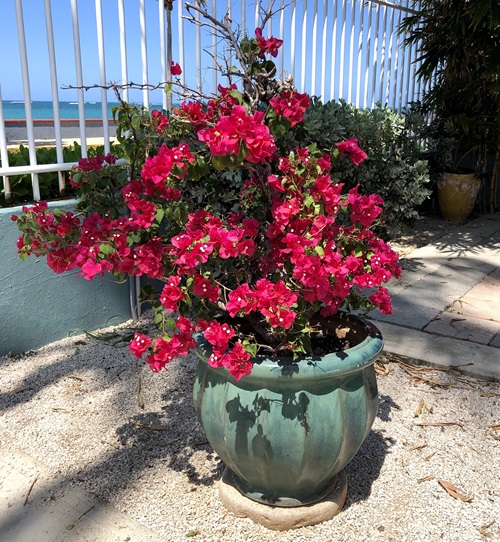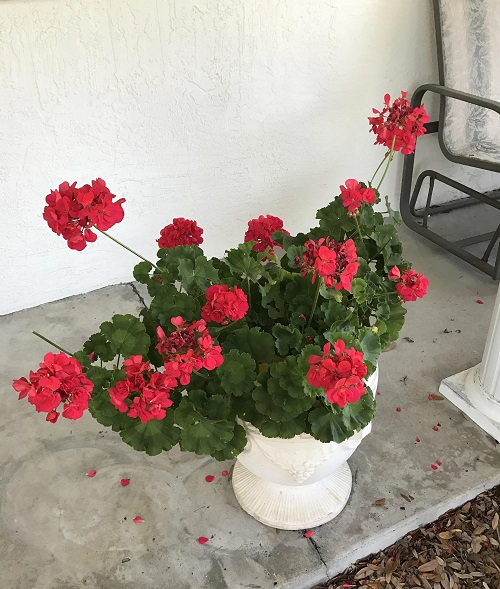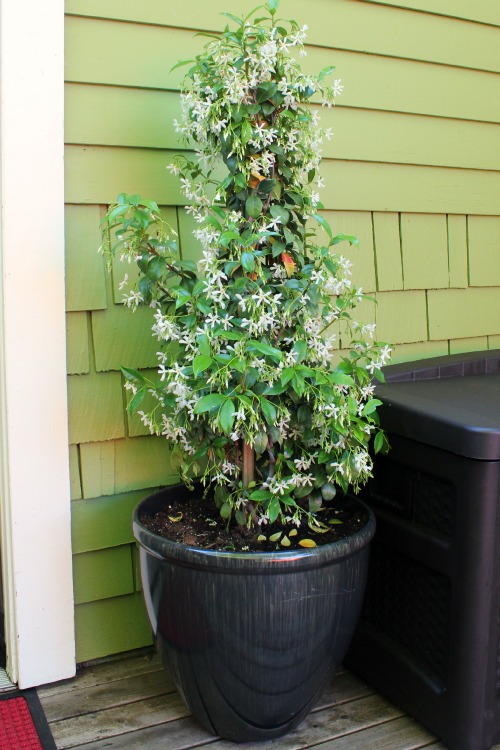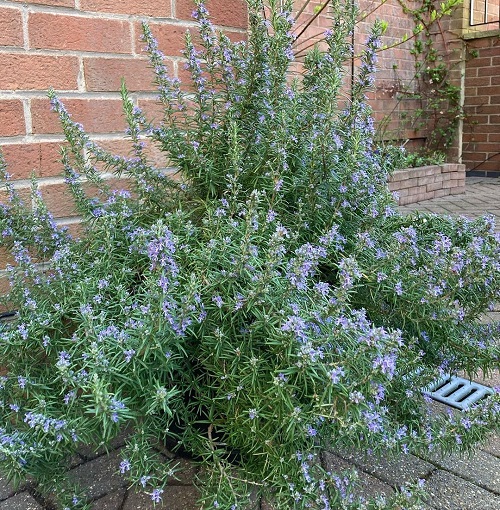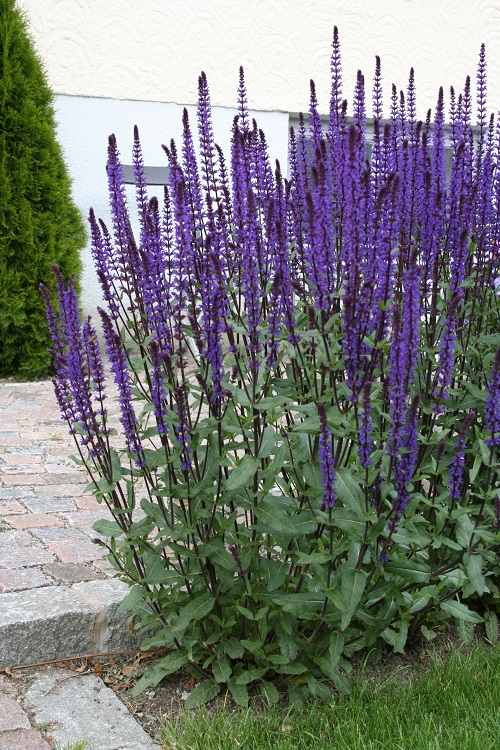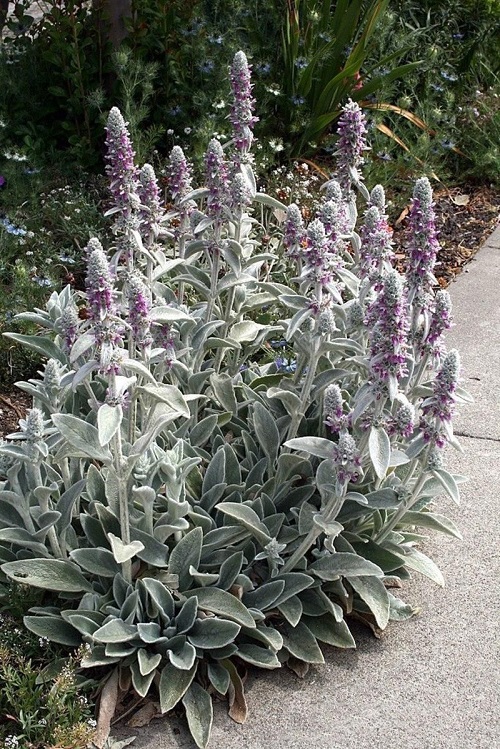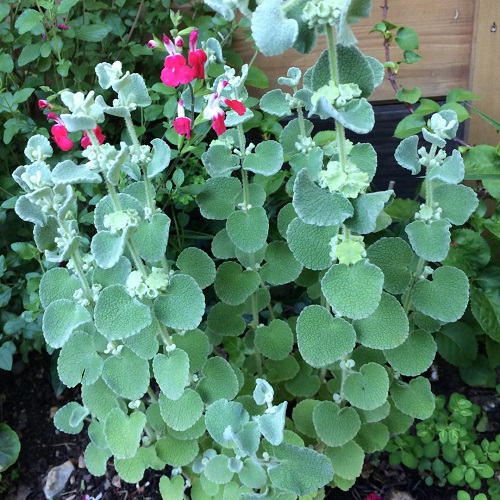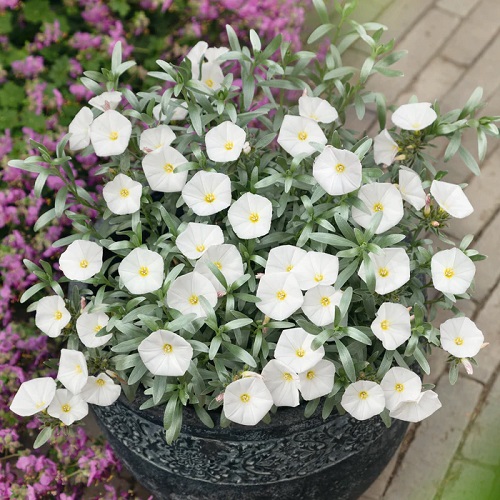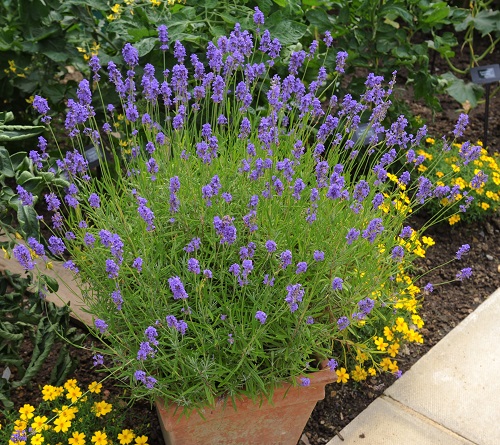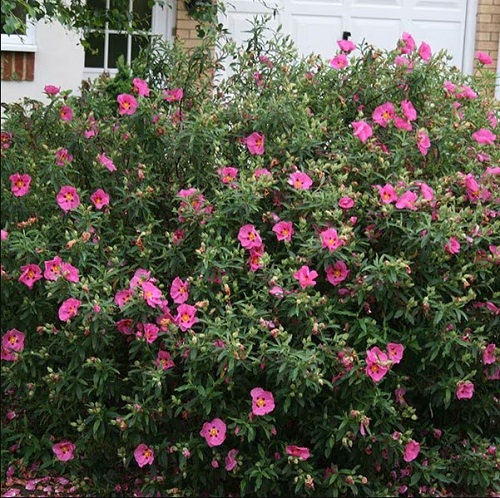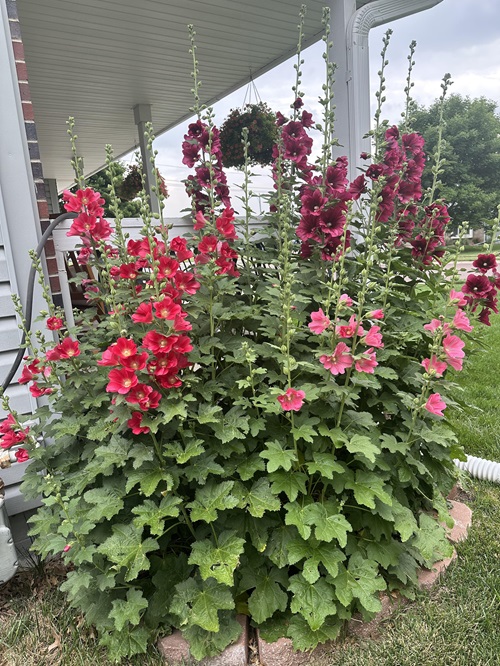Are your winters too chilly for that dream Mediterranean garden? These Cold-Hardy Plants will do the trick!
Sunny-hued blooms, rolling borders of aromatic herbs, orchards, and gravel paths—these are some of the ingredients of the rustic Mediterranean garden of your dreams! But can they survive harsh winters? Let’s find out with our selection of cold-hardy plants!
What is a Mediterranean Garden?
We are talking hot, arid summers and mild, wet winters, like those you experience in hardiness zones 9-10. Think south of Italy, seaside France, Spain, Greece, and parts of California, Central Chile, Hawaii, and even Australia!
The best plants to grow in a Mediterranean garden are edible, aromatic, architectural, and easy to maintain! As the slow-living farm-to-table concept is back in fashion, gardens replete with useful and native herbs, flowers, veggies, and fruits are all the rage.
And for good reason! Climate change is a scary reality; gardeners worldwide are switching to sustainable plant choices that are drought-tolerant and resilient to weather extremities. And nothing fulfills that better than a Mediterranean garden.
The quintessential Mediterranean design has gravel paths and tiles instead of resource-heavy lawns, dining areas close to the kitchen, symmetrical fruit tree orchards, pastel-hued pots, hedges of fragrant herbs and blooms, watering holes, and an overall laidback feel.
Consider it a perfect excuse for loved ones to get together and enjoy sun-kissed, homegrown recipes in a biodiversity-rich, healthy garden. Now, let’s check out the best cold-hardy herbs and blooms for your own Mediterranean garden in the chilliest winters!
Cold Hardy Mediterranean Plants
1. Bougainvillea
Botanical Name: Bougainvillea spp.
USDA Zones: 9-11
First up, we have a staple of Mediterranean gardens—Bougainvillea! It produces unique flowers with paper-like petals in shades of red, purple, magenta, orange, and white. It blooms in summer in cold climates and almost year-round in warmer ones.
This vining shrub is perfect for trellises, pergolas, and even as a ground cover or container plant.
Note: Bougainvillea will die back and grow as an annual in colder regions during frost unless you overwinter them indoors.
2. Geranium
Botanical Name: Pelargonium zonale
USDA Zones: 9-12
Looking for the perfect plant for a window box display or hanging baskets? The zonal geranium, with its upright, bushy habit, is a perfect choice! Blooming from mid-spring until frost, this plant is also popular as a garden bed in Mediterranean landscapes.
In extreme cold, however, you can overwinter the plant indoors.
3. Common Jasmine
Botanical Name: Jasminum officinale
USDA Zones: 6-10
A cold-hardy jasmine variety, this plant can easily survive freezing temperatures. It also needs a few months of chill weather to sprout seeds and to produce its star-shaped fragrant flowers efficiently.
This semi-evergreen vine provides perfect natural shade over a trellis, fence, or wall and can even be grown in pots. When picking containers, choose warm, earthy tones and textures in line with Mediterranean design.
4. Jerusalem Sage

Botanical Name: Phlomis fruticosa
USDA Zones: 5-10
Jerusalem sage is one of the best cold-hardy varieties of Phlomis. This drought-tolerant plant can survive in several soil types and temperatures as low as 23 F (-5 C). With velvety gray-green leaves, it produces tubular flowers in yellow, pink, and lavender.
Pro Tip: Prune heavily in winter and apply ammonium phosphate fertilizer in spring for best growth.
5. Rosemary
Botanical Name: Salvia rosmarinus
USDA Zones: 6-11
What’s a Mediterranean dish without rosemary? This aromatic herb with shrubby growth features silvery-green, needle-like leaves alongside white or blue flowers that emerge in late spring and bloom till winter.
While rosemary does tolerate freezing temperatures, smaller varieties should be protected against prolonged frost by overwintering indoors.
6. Caradonna Sage
Botanical Name: Salvia nemorosa
USDA Zones: 4-9
Among the many sage varieties, ‘Caradonna’ is the most cold-hardy. It produces fragrant purple flower spikes that bloom through late spring to summer. You can extend the blooms via deadheading.
Remember to apply a layer of compost or other organic matter for mulch when temperatures drop to -22 F (-30 C).
7. Lamb’s ear
Botanical Name: Stachys byzantina
USDA Zones: 4-9
A super perennial for a sunny spot in your cold garden, the Lamb’s ear is perfect for attracting pollinators. Its pinkish-purple flowers and furry-textured leaves are favorites of wool carder bees.
The foliage dies back and reemerges in spring in colder climates.
8. False Dittany
Botanical Name: Ballota pseudodictamnus
USDA Zones: 7-10
A sub-shrub with a compact growth habit, the false dittany is known for its soft, whitish-green, hairy leaves. Whorls of pink flowers bloom in late spring and early summer. This cold-hardy, drought-tolerant plant survives in temperatures as low as 14 F (-10 C).
9. Silverbush
Botanical Name: Convolvulus cneorum
USDA Zones: 8-12
This evergreen Mediterranean is perfect for gravel gardens and containers. It has silvery leaves and white trumpet-shaped flowers that bloom in late spring and summer. This plant can survive dips as low as 23 F (-5 C) but is not hardy to frost or cold, wet winters.
This plant pairs well with the purples and blues of globe thistle, lavender, and catmint.
10. Lavender
Botanical Name: Lavandula angustifolia ‘Munstead’
USDA Zones: 5-9
A favorite in Mediterranean gardens, the cold-hardy ‘Munstead’ variety of lavender is a good choice. Whether you plant it as a hedge or in a container, it will survive beautifully in poor soil and drought conditions.
While this classic herb can tolerate lows of -10 F (-23 C), if your region gets extremely cold, here’s what you do with lavender before winter.
And if placing them in insulated containers, distribute them around your seated dining area to enjoy their fragrant blooms as you dig into your garden-fresh delicacies!
11. Curry Plant
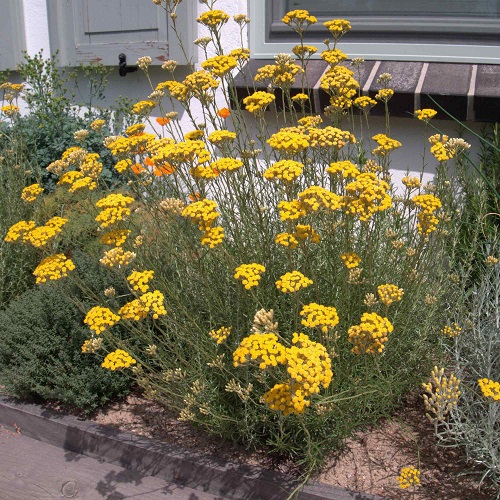
Botanical Name: Helichrysum italicum
USDA Zones: 7-10
This Mediterranean subshrub’s name comes from the pungent, spicy odor of its needle-like foliage. In summer, the curry plant blooms with clusters of vibrant yellow flowers. The plant can tolerate cold as low as 14 F (-10 C) for short periods of time, but not longer.
12. Turkish Sage
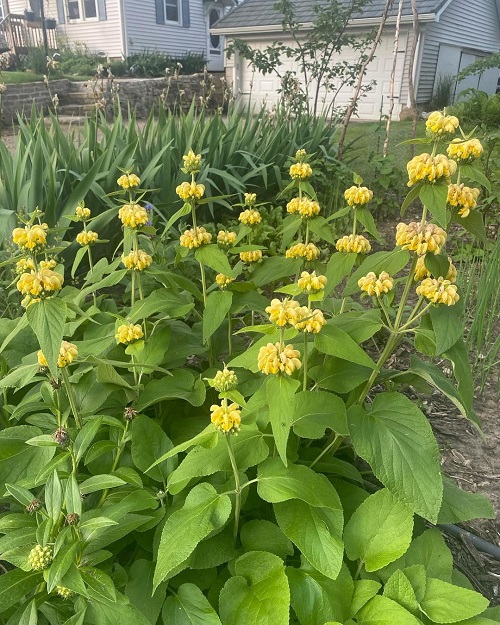
Botanical Name: Phlomis russeliana
USDA Zones: 4-9
Turkish sage is the perfect plant to attract bumblebees and other lovely pollinators to your garden. Its hooded yellow flowers bloom from summer to early autumn. It can survive in temperatures as low as -4 F (-20 C).
Ensure this cold-hardy, drought-tolerant herb is planted in a medium with adequate drainage, especially in winter. This prevents the roots from catching a cold!
13. Sea Holly

Botanical Name: Eryngium maritimum
USDA Zones: 5-9
If you have a gravel garden, sea holly is a must-have! This perennial is drought-tolerant thanks to its long taproot and thrives in dry soil. It can also survive temperatures down to -4 F (-20 C).
Known for its year-long blooms, sea holly belongs to the carrot family and features spiky silver leaves and silvery-blue flowers that bloom in summer.
14. Mediterranean Spurge
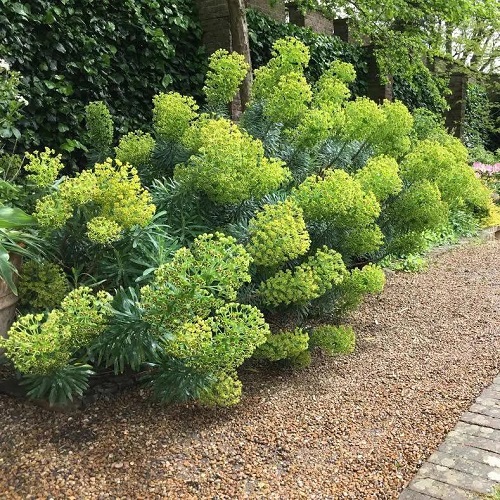
Botanical Name: Euphorbia characias
USDA Zones: 6-8
The Mediterranean spurge sports chartreuse-green bracts and produces tiny flowers atop silvery-blue leaves in spring. This plant is perfect for decorating your garden border and is drought-tolerant once mature. It can tolerate frost and lows of up to 5 F (-15 C).
Note: Protect with a frost cloth in zone 6 and below winters when temperatures drop below -10 F (-23 C).
15. Globe thistle
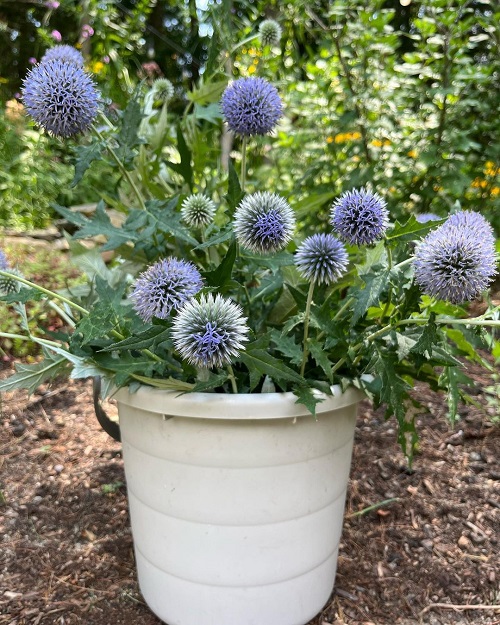
Botanical Name: Echinops spp.
USDA Zones: 2-8
This plant showcases spiky globe-shaped flowers in blue, violet-blue, and silver-gray colors. It also has thistle-like foliage in silvery-gray or green, great for adding structural interest to garden borders and beds.
This plant is frost-hardy and drought-tolerant, perfect for a sunny Mediterranean garden in the cold!
16. Rock Rose
Botanical Name: Cistus spp.
USDA Zones: 9-13
You could choose a variety of rock roses in different shades of pink or pure white. This evergreen is generally low-growing, but some of the tallest specimens can reach up to a few meters in height.
Besides being drought-tolerant and thriving in dry soil, the rock rose is cold-hardy to an extent. However, if temperatures dip below 5 F (-15 C), bring them indoors or provide shelter from frost.
17. Great Mullein
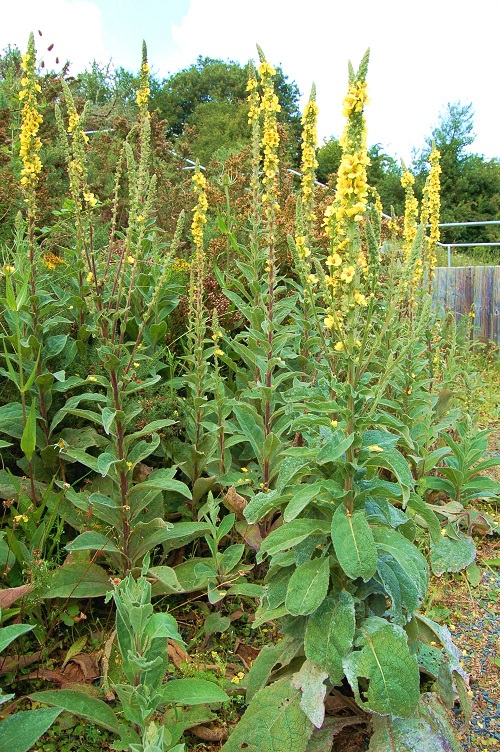
Botanical Name: Verbascum thapsus
USDA Zones: 3-9
Commonly grown as biennials or short-lived perennials, mullein varieties produce flowers in white, purple, pink, or blue. They feature upright flowering spikes that are well-suited for sunny garden borders and gravel gardens.
Blooming in spring and summer, this medicinal plant is also frost-hardy.
18. Hollyhock
Botanical Name: Alcea rosea
USDA Zones: 3-9
Our final Mediterranean cold-hardy candidate is a cottage garden favorite! Hollyhock, similar to mullein, features tall spires of flowers, sometimes reaching up to over two meters in height.
This plant readily self-seeds and is frost-hardy, so you can have a dramatic display in your garden for many seasons.
Speaking of winter, don’t forget to check out these cold-hardy vegetables and succulents for your garden. If your region can support citrus trees, olives, almonds, and fruits like pomegranates and grapes, do not hesitate to add them to your Mediterranean garden!


